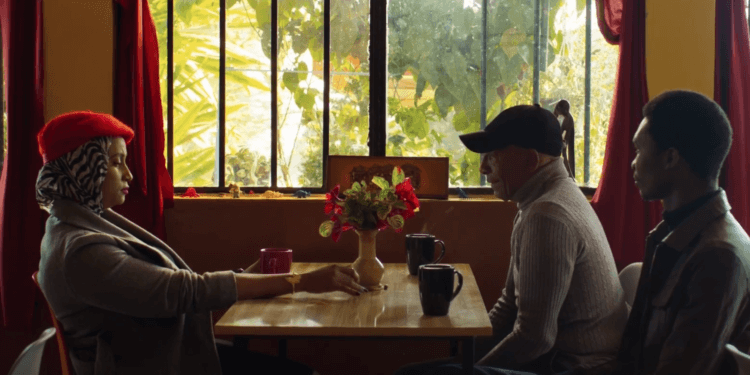Earlier in July, Maisha Magic Movie Half Open Window won Best East African Feature at the Zanzibar International Film Festival (ZIFF) 2023. It’s an hour fifteen-minute movie that tries to pack a punch in a slow burn story. Does it succeed?
Directed by Omar Hamza, Half Open Window follows Libabu (Edwin Nyutho), an elderly widower living alone in a sprawling farm estate somewhere upcountry; somewhere green, fresh, and fertile. It’s pretty clear early on that not only is he affected by the loss of the love of his life, his wife Martha, but that his mind is also starting to leave with her.
Parallel to this story is that of his grandchild, Adili, who is hustling away in Nairobi, not able to find a job, for the reasons that many people in Nairobi are unable to find a job. His domineering uncle Sirama asks him to come back home and take care of his grandfather, Libabu – as he also looks for a title deed for the land that he is apparently in desperate need of.
Half Open Window is a common – and not in a bad way, common in a good way – story. That is in fact what actually makes it relatable: we all know stories that sound like this, where kids are trying to get the older people in their families out of the way, waiting until they die, so they can get their hands on whatever they feel they’re entitled to. Of course, some people unfortunately try to rush the process along, which is what Sirama and his wife Delilah (ha!) are doing, trying to get Libabu off the land so they can do what they want with it. We also know many stories of the children who are away from home and who send money to replace time and buy leeway, even things that would possibly have been present if they were around.
The story in itself is logical, but the scripting and loose ends are not tied neatly either because of the scripting or editing. It feels like there is a lot more the audience is not privy to, and so many questions are left unanswered by the end of the movie. For instance, there is such a huge build-up to Adili’s parentage, and that all falls flat in what feels like a rushed ending. I had no idea what Gitahi, Libabu’s brother, wanted Libabu to do with the land; and Delilah’s deflation? Very anticlimactic in a way that is not only an easy solve but also not believable. And how exactly was the job organised when Adili hadn’t held up his side of the bargain?
On the other hand, the performances are very good. It’s always enjoyable to see new or relatively unfamiliar faces on our screens, and especially in a nascent film industry like ours, and to see older actors in age-appropriate roles that don’t require them to dye their hair to play their part. Nyutho as Libabu is compelling, and convincing as an old man losing his mind in grief. Adili is very much the Nairobi boy, even though there’s a bit of a choppiness to Samson Omondi’s performance that feels like it is a seasoning factor as opposed to a lack of talent. Amalie Chopetta shines as the manipulative aunty-in-law in cahoots with the ‘bad guys’; her Coasterian flavour adds that zing to push her into proper Mkamzee Mwatela-like Cruella De Ville territory. I generally enjoy Lucarelli Onyango on screen, and usually want more, and Wangui Muriu is an incredibly pleasant blast of winsome ingénue energy, the perfect epitome of bashful country love. It made me want a Nairobi boyfriend too. A little romance makes a movie good for me, even if it isn’t the main focus. And not just for levity or weight, depending on what side of love you fall on, but also for realism and the essence of any human condition, from Nairobi Half Life to Mission to Rescue.
So, should you watch Half Open Window? Yes. Earlier, I had mentioned a bit of choppiness where Adili’s performance was concerned, but it also manifests in parts of the script. That said, Half Open Window is an earnest and simple movie about trying to do the right thing, and the production itself is doing the right thing.
As a final comment, I don’t know what the title is about. But I would assume that part is open to interpretation for the viewer; something that talks about one’s perspective on life, and how really, whether we know it or not, we are really half in and half out between this world and the next. Hopefully, also, old age comes for us all. A sobering picture, a sobering piece to consider; we think we’re in control and functioning at 100%, but all of that can change in a second; not as something to be fearful of, but as something to be mindful of.
Half Open Window ends with some statistics about how many people die from Alzheimer’s or dementia (which they make clear are two different things in the movie) and also ties in the theme to our today living in a country where often, it’s the kids and extended grandkids who take care of the elderly, because we don’t have that culture of putting old people in homes. And I hope we never ever have to develop it.
Enjoyed this article?
To receive the latest updates from Sinema Focus directly to your inbox, subscribe now.










